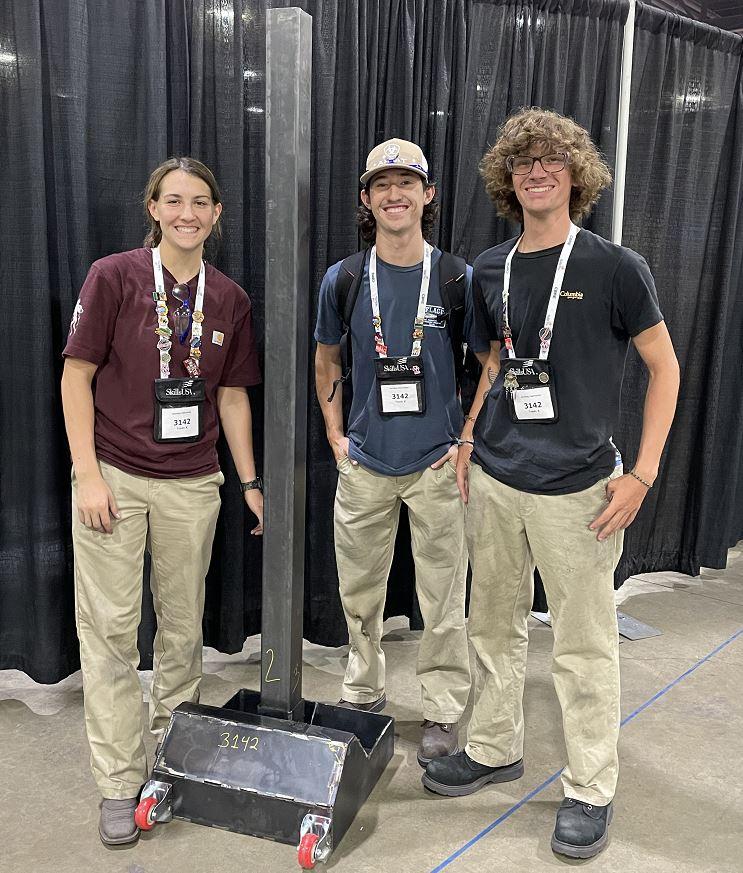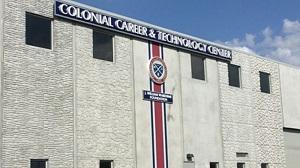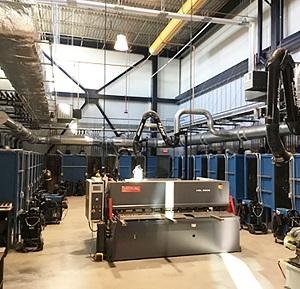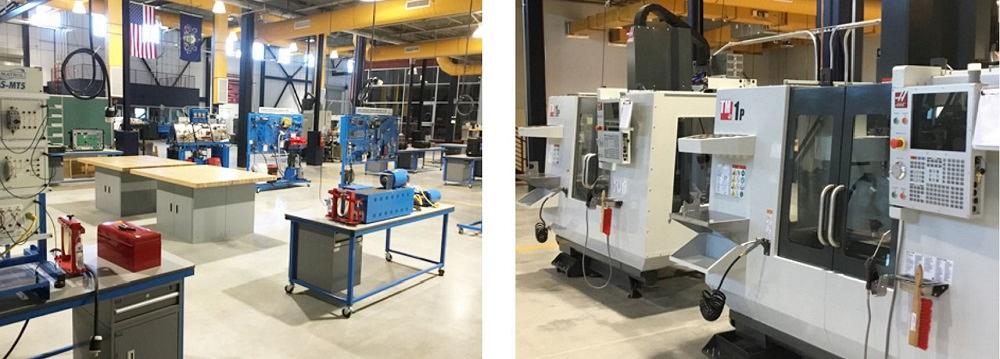
Oxford High School freshmen (left to right) Alina Myers, Camden Elmo and Bowen Jarman pose with a portable welding screen during the SkillsUSA competition in Atlanta last June. Their effort won first place in the welding preparation category.
Many communities in the United States have long taken local manufacturing activities for granted. This is not the case in Adams County, Pennsylvania.
When a bond was issued for Conewago Valley School District in late 2010, Principal Russell Greenholt saw an opportunity not only to improve the business of New Oxford High School, the area's only high school, but also to achieve a major milestone. Support local manufacturing companies. Since manufacturing is the county's largest economic sector and provides just over 8,600 jobs, according to the Adams Economic Alliance, Greenholt has to live up to this commitment to vocational education.
“At that time, about 70 percent of students attended four- or two-year schools [after graduation], which means the rest are in the workforce,” Greenholt said. "We felt we had to do something for the 30% of kids who don't go to school."
Production was a priority for Greenholt as he pursued this project. He says he read a survey of manufacturing leaders in which nearly three-quarters agreed that local schools and community colleges are effective ways to try to solve the problem of creating a skilled workforce for today's modern manufacturing jobs. He wanted New Oxford High School to be a testing ground for this theory.
“One day I went to our department head and said, 'We're going to modernize the workshop, how about a 25,000-square-foot, simulated factory?' He said, 'Are you serious?'
Greenholt was. He made the same call to the school board, and they answered the same question. After making the case, Greenholt persuaded and challenged the board of directors to build community support for an educational institution that would be the envy of other school systems in the area.
laying the foundation
One of Greenholt's first assignments was to contact the Adams County Technical Preparation Program at nearby Gettysburg High School. He wanted to reassure them that the new Career and Technology Center (CTC) at New Oxford High School would not seek to replace programs associated with the Tech Prep programme, but would be an extension.
The same thought process applies at Harrisburg Area Community College. Although the school had a welding program, it was only offered on the school's Harrisburg campus. The nearby universities of New Oxford, Gettysburg, and York did not have the physical planning needed for welding training.
Greenholt made it clear to these officials and nearby school districts that New Oxford is not trying to replicate programs offered elsewhere. The school attempted to develop specific programs adapted to the needs of local businesses. In fact, the program is designed to open places in the New Oxford High School's welding program to other area students who wish to learn the profession.
Working with the local education community, Greenholt spent the next several months visiting local businesses, clubs, and professional organizations. He makes donations like cash and equipment, and when the company can't afford it, he goes home with a pledge of scrap and scrap metal that can be used to solder vouchers.

The Conewago Valley School District in Pennsylvania opened its new Colonial Employment and Technology Center in 2019 to better prepare its graduates for employment at one of the area's many manufacturing facilities.
Greenholt remembers meeting a local concrete contractor and asking the owner to provide panels for the facade of the Colonial Career and Technology Center (CTC) building. (The New Oxford High School is known as "Colonial") He wanted each painting to represent a different tangible character of what could be made with the materials.
“I wanted to highlight what the company had done. I wanted to emphasize the production side,” Greenholt said.
The company donated the panels and installed them free of charge for the school district. Other companies offer 3D printers and welding power supplies. The New Oxford Social Club donates computers and software, including computers that can stream augmented reality programming. For example, a student working with an augmented reality program can interact with, disassemble and reassemble a small-block Chevrolet engine without a real engine in front of them.
The $5.2 million facility was nearing completion as the 2019 school year approached, Greenholt said the school district raised $2 million for CLC equipment.
“When I visited these companies, I saw that the locals were very proud of what they had achieved, especially when it came to production, and they were willing to work with us,” Greenholt said.
For many companies, that made sense. One such company was Precision Cut Industries in Hanover, Pennsylvania.
“When school officials came to PCI and shared their vision of what they wanted to do, we were 100% behind it,” said Shonna Sites, the company's director of operations. “We saw what that would do for the students and the community, so we negotiated and donated. The relationship grew from there.
New CTC facilities
In the fall of 2019, CTC officially opened its doors.
What is immediately noticeable about the new addition is that most of the co-working spaces are visible through the large windows on one side of the driveway that runs along the CTC. Courses in these seminars are not closed to the rear of the building and are only available to those who have registered for the course.
"One of the smartest things we've done is put windows in this hallway," said Joe Connolly, a college counselor at New Oxford High School. “Maybe students who wouldn't normally be interested in this class come in and see the robot in motion, all of a sudden it piques their interest.
"Now we have this beautiful, clean environment and people can see everything," Connolly continued. "It gives the students a chance to showcase the projects they have been working on for all to see."

The new factory contains 20 cabins in the welding area.
The welding area now includes 20 separate welding booths, all with adequate ventilation and conductive gases from outside the building. The additional welding booth gives each student the opportunity to work on their own, so many students share the workspace and collaborate with peers on their shoulders, said Rick Jones, a welding and mining instructor. (The old engineering room had 10 welding stations on communal benches.) As a result, the separate rooms foster a sense of responsibility, as each student must keep clean and treat equipment with respect. It is impossible to blame someone else when someone else is not guilty.
The introduction of CTC has certainly increased interest in school welding. After years heavily affected by the COVID-19 pandemic, New Oxford students are back in a more familiar learning environment, rather than the previously familiar distance learning mode, and are arriving at CLC in record numbers.
Rick Jones said they have room for 80 students each fall and spring. There are four casting seasons of 20 spots each, open in the fall and several seasons in the spring. For the two metal-shield arc welding classes, each of 20 students for a total of 40 students, Jones said the school could advance to classes of 80 students.
Right now, Jones said, officials look at students' performance in terms of grades in their previous CTC courses, whether they took non-welding courses and how engaged they were with work in the class. In many ways, it is similar to the real world, because they can only pass the welding program if they do what is required.
Connolly said the interest in the CTC welding program coincides with parents and students realizing that not everyone is destined to attend a four-year college. Someone has to learn a profession because without their talent society cannot function.
“People are tired of finding an electrician, plumber, or other qualified handyman, and when they do, that person is usually gray or bald,” Connolly says. “The more people get excited about it in their lives, the more they start to see the value of the work.
“When I went to school in eastern Pennsylvania, I either went to college or did some apprenticeship as consolation prize. It was malicious.” "But fortunately, the pendulum has gone far enough back that many teachers, their focus or the fact that, no matter what specific subject you teach, understand the value of a professional education."
While the school's CTC has proven to be a much-needed resource during construction and opening, Connolly said 110 businesses in the area have partnered with the program in various ways that make the learning experience even more. Some companies offer job shadowing, where students get a half-day glimpse of working in a manufacturing facility, while others open their doors to students for a skills test, where students must pass a welding test as if they were new employees to the company. . Some companies donate their time to employees who serve on advisory boards that direct the development of CTC programs or who appear in front of a class to talk about their work and industry. Connolly said PCI, Conewago Enterprises Inc. and KLK Welding Inc. Below are examples of local companies that have taken the time to help students build their professional education and can pay off by securing a job for candidates after graduation. .
Students mark their marks
As if the large number of students trying to enroll in a new welding course wasn't enough evidence that the school had been exposed to CTC, New Oxford High School received another warning this summer. His first entry in the SkillsUSA competition led to a national championship in the welding fabrication division.
Alaina Myers, now a senior, and Camden Elmo and Bowen Garman, who graduated from New Oxford earlier this summer, were named the inaugural winners after building a portable welding screen. The team had to complete a knowledge test, participate in an interview with subject matter experts, and then create a welding screen from a series of printouts. The whole process took over six hours.

The expanded co-working space and editing cell were part of the CTC project.
It was a district competition win, where the trio built a pizza oven, and another statewide win, where the team built a metal treadmill, ahead of the national championship. More than 6,500 high school and college students competed in 108 different professions, technologies, and leadership competitions, including three welding classes: welding, welding preparation, and welding carving.
“This is the biggest surprise to me out of all of this, that our SkillsUSA team has made it to the regional, national and national levels. To me, this is better than a state championship in a sport because they competed at the national level and won,” said Connolly.
"But it's not just about showing up and winning," he added. "It's about all the steps before that, including sending a letter of support to a local business that says, 'Hey, are you going to help us sponsor? And then those who call the answer: As a team, they have done all this: now they have business acumen they had not had before: they have the hard skills and the soft skills needed for the future.
Myers says he didn't really know what welding was until he started taking welding lessons at CTC. He finished first class with his best friend in welding class. He stuck to an unfamiliar but exciting program and learned to love it. Since then he has completed all welding courses including some independent courses, electronics course and basic machinery course.
“Welding takes me to a place where I can forget everything. Everything goes smoothly, it’s just me and the poodle,” Myers said. “That's what I really like; It really makes me feel really happy.
Last summer, while his friends were working odd jobs in a neighborhood retail store, Myers would get up at 5 a.m. every morning to work at PCI, where he could do a variety of concoctions and practice different castings. The experience only strengthened his desire to pursue this passion. He plans to attend Penn Tech in Williamsport, Pennsylvania to further his education in manufacturing.
Of course, Myers is only one student, but there are others. Connolly said CIT students receive multiple job offers before graduating. In fact, some sign a pledge, just like their classmates who pledge to play sports for college in their freshman year.
Greenholt has since retired and spent time doing carpentry and enjoying a new lathe purchased after leaving his position as supervisor. He introduced the tool to his 10-year-old granddaughter and discovered that she loved making things with her own hands. It was the latest project of a miniature car.
“I told him that as you get older, no one can take that power from you,” Greenholt said. “It will be a skill that you will possess for the rest of your life, and if you continue to do so, you can improve.”
Life learned the lesson of education. Adams County residents understand that these courses are not restricted college courses.



